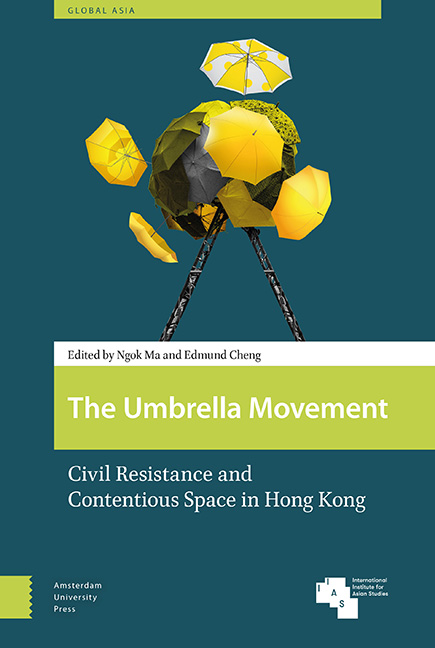Book contents
- Frontmatter
- Contents
- Acknowledgements
- Introduction: Civil Resistance and Contentious Space in Hong Kong
- Part A Trajectory and Contingency
- Part B Repertories and Strategies
- Part C Regime and Public Responses
- Part D Comparative Perspectives
- Appendix: The Umbrella Movement—Chronology of Major Events
- Index
- Publications/Global Asia
6 - Creating a Textual Public Space: Slogans and Texts from the Umbrella Movement
Published online by Cambridge University Press: 21 November 2020
- Frontmatter
- Contents
- Acknowledgements
- Introduction: Civil Resistance and Contentious Space in Hong Kong
- Part A Trajectory and Contingency
- Part B Repertories and Strategies
- Part C Regime and Public Responses
- Part D Comparative Perspectives
- Appendix: The Umbrella Movement—Chronology of Major Events
- Index
- Publications/Global Asia
Summary
Abstract
The Umbrella Movement (Sept-Dec 2014) represented a watershed for Hong Kong's political culture and self-understanding. Based on over 1000 slogans and other textual and visual material documented during the movement, this study provides an overview of its claims. The slogans mobilize a diversity of cultural and historical repertoires that attest to the hybrid quality of Hong Kong identity and underscore the diversity of sources of political legitimacy. Finally, it is argued that by establishing a system of contending discourses within the occupied public spaces, the movement strived to act out a type of discursive democracy, which represents an unfinished attempt to build a new civic culture among Hong Kong's younger generation.
Keywords: Umbrella Movement, slogans, identity, deliberative democracy, speech act theory
The Umbrella movement has defied easy characterization: it shares aspects of different movements and encapsulates some of the contradictions of Hong Kong itself. As a territory in which the society is both in some respects post-materialistic (Ma, 2011) and governed by a political system that is not (yet) democratic, Hong Kong presents an interesting theoretical paradox with implications for the nature of the Umbrella Movement. The argument developed in this chapter suggests that, unlike much of the rhetoric developed, for example, during the 1989 democracy movement, in which many participants articulated their role as making personal sacrifices for the future of the Chinese nation, the Umbrella Movement mobilized a great diversity of cultural references that constructed a far more heterogeneous notion of China. These diverse frames nurtured an open debate on the nature of the democratic community, both within the occupied zones and more broadly throughout Hong Kong. In this sense, the movement's significance lies in its ability to represent an alternative model to many of the democratic movements that developed in mainland China over the 20th century.
The present chapter is devoted to one specific aspect of the movement that has not yet been studied systematically: over the 79-day occupation, the three occupied areas (Causeway Bay, Admiralty, and Mongkok) were colonized not only by artwork, but also by textual material in every size and form. What is expressed in these texts produced by diverse authors—some of them political groups, some unorganized participants, some just passers-by? How do they relate to the movement as a whole and help in its characterization?
- Type
- Chapter
- Information
- Umbrella MovementCivil Resistance and Contentious Space in Hong Kong, pp. 149 - 182Publisher: Amsterdam University PressPrint publication year: 2019



